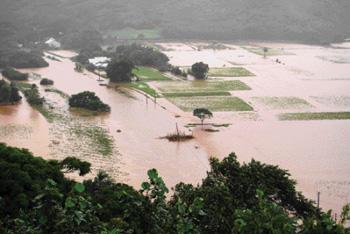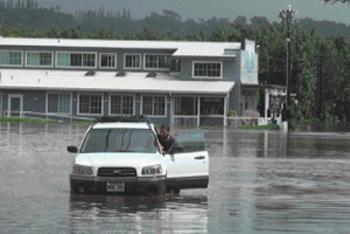LIHU‘E — No amount of scientific charts or graphs to date can predict with 100 percent accuracy the effects global climate change might have on the islands in the coming years, researchers said at the Global Climate Change Impacts on
LIHU‘E — No amount of scientific charts or graphs to date can predict with 100 percent accuracy the effects global climate change might have on the islands in the coming years, researchers said at the Global Climate Change Impacts on Kaua‘i conference last weekend.
Nearly half the auditorium at Kaua‘i Community College Performing Arts Center was filled Saturday with people, many with notebooks in hand, who came to hear the forecasts from local scientists on issues such as sea level rises, temperature fluctuations and rainfall abundance.
Though scientists across the world seem to be in disagreement about whether global warming is real, the University of Hawai‘i Geology Department’s Dr. Chip Fletcher said this is an inaccurate notion.
“Scientists are the greatest skeptics,” he said. “I was both skeptical and denied global warming until recently.”
After diving into scientific literature, Fletcher said he was “overwhelmed” by the evidence of global warming’s existence and humans as the “root cause.”
Studies report that since 1880, the average global temperature has increased 2.2 degrees Fahrenheit or about .023 degrees each year, he said.
“Scientists are not doing an adequate job of communicating the facts about climate change,” he said.
It is with no doubt that fluctuations are occurring due to human activity, according to the U.S. Geological Survey’s Dr. Gordon Tribble.
“Climate has always been changing, but it’s virtually certain that we are causing changes that will warm the planet,” he said.
Not only have humans allegedly had an effect on the weather, but people have had an altering effect on native ecosystems, which will only get worse with climate change, he said. For instance, some 125 native birds thrived on island prior to human habitation. Now only 36 remain and their populations are dwindling.
“A lot of native plants and animals are really hanging on by their fingernails,” he said.
Many natural ecosystems will be in harm’s way, including coral reefs, according to the UH Hawai‘i Institute of Marine Biology’s Dr. Paul Jokiel.
With nearly 7 billion people on the planet, human consumption continues to grow which inevitably generates more carbon dioxide in the air, leading to altered weather patterns, he said.
Some of those patterns could include “big events” like the major flooding last week on the Eastside and North Shore, said Dr. Thomas Giambelluca of the UH Geography Department.
The islands are going to get more of them and they will be more intense, he said.
He added that while the events may wreak more havoc, the amount of rainfall overall has dropped and the state has become “significantly drier,” he said.
Paired with “very high rates” of increasing temperatures, native ecosystems could endure major consequences, he said.
Carbon dioxide is at its highest level in 15 million years, Fletcher said.
Causing a host of climatic problems, carbon dioxide boosts temperatures, including in the ocean which, in turn, causes a sharp increase in the number of melting glaciers. The number of melting alpine glaciers has more than doubled since 1988, he said.
Fletcher predicts about one meter, or a three to four foot increase in sea level by the end of the century.
“We should plan for this impact,” he said.
Not only will big waves punch further into coastal planes, but “dramatic flooding” will occur, leaving water with “no place to go.”
“I think we are going to be saying aloha to most of our beaches,” he added.
With about one foot per year erosion rate, Fletcher said the county Planning Commission is conducting a study based on how far inland the sea will reach over the next 20 to 50 years.
The study is expected to show, “perhaps, it’s not a good idea to build a hotel there,” he said, adding that he recommends “retreating from the coast, upwards and back.”
“If we are not proactive, our grandchildren are going to be stuck with no more resources,” Jokiel said.
• Coco Zickos, business and environmental writer, can be reached at 245-3681 (ext. 251) or czickos@kauaipubco.com.



